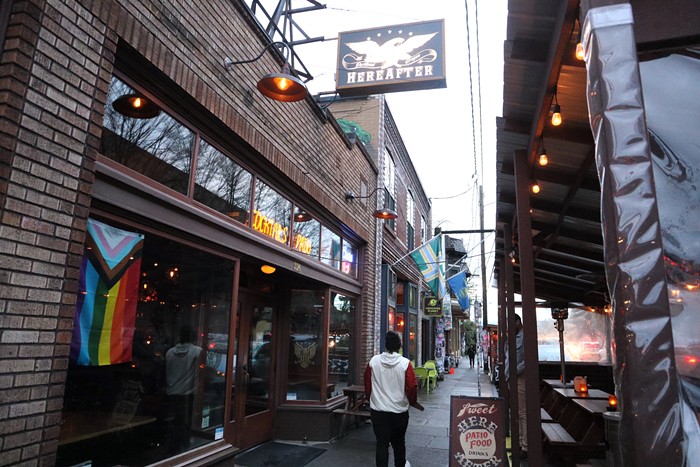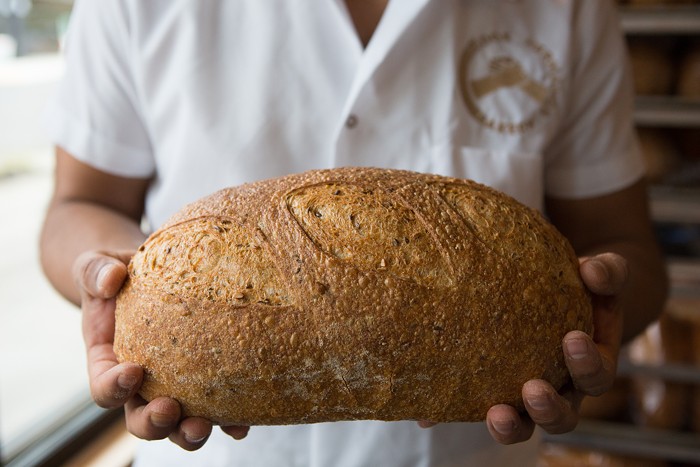The substantial pedigree of the low-lit, casually chic Bamboo Sushi—a first-of-its-kind "sustainable sushi" restaurant—shows nothing if not earnestness. The Marine Stewardship Council and the Green Restaurant Association certify the eatery; it's also partnered with Monterey Bay Aquarium, Blue Ocean Institute, Salmon Nation, KidSafe Seafood, and Seafood Choices Alliance. On the sushi bar, a tri-fold display explicates the numerous reasons why eating nigiri at this one particular spot in the world is better than something a few blocks or 1,000 miles away.
All of this is surely enough to capture a certain group of diners. For others, earnestness is less important, and much less persuasive, than a good Kobe beef burger.
Yes, Bamboo Sushi has a Kobe beef burger on their yaki plate menu. Yes, it's good: flame broiled with tangy aged white cheddar and aromatic wisps of garlic and onion. The Kobe beef patty is rich and tender (and crafted with sushi-chef precision), but the small, house-made brioche bun adds nothing, being both too substantial and inconsequential. It's a few notches below the all-dancing, all-singing fantastic burger I'd expect for $14.
However, the wild Alaskan Coho salmon ($10, also on the yaki plate menu) is a thing of beauty. The flaky, tender fish is prepared medium rare—bathed in Meyer lemon miso broth that complements and elevates its delicate flavor. Thin slices of sweet, smoky roasted pepper contrast the lemon and salmon, but the accompanying fingerling potatoes are uninteresting and unnecessary.
Bamboo Sushi, of course, is primarily concerned with those rolled or pressed miracles of rice and piscine delight. Here, the chefs transform seasonal, local, and fresh fish into elegant and beautiful rolls. One can expect top-notch execution of standards, but there's also a definite wow factor in Bamboo's signature offerings, like the Hoki Poke box: a pressed sushi with red crab salad, tuna, avocado, and green onion. The flavors of the pieces roll lusciously across the tongue—deep tuna and avocado working against nutty terrestrial tones of sesame and chili from togarashi.
Other signature rolls get a bit more creative. Chasing the Dragon (an allusion to opium use) combines tempura-fried shrimp, spicy tuna, red crab, cucumber, and flying fish roe with Bamboo's tasty rice, all crusted in tempura crisps. The tempura inside and outside adds nice fried crunch amid lush constituents while the roe pops lightly between the teeth.
The nigiri options are also very well executed. Spicy scallop nigiri, piled high with the tender shellfish, has a slow, mild heat. The black fish roe nigiri is equally generous, with tiny shining beads of roe, topped with an optional raw quail yolk—a rich and decadent experience, albeit one for serious sushi eaters only.
Sitting at the sushi bar, shooing away the often too-attentive service while watching the chefs slice, press, and roll—their quick, graceful movements punctuated with an occasional sharp clap of their hands—it's nearly possible to forget you're eating sustainably. Which is good: World saving isn't necessarily compatible with enjoying a meal. Still, with many of the world's fisheries in decline according to the Marine Stewardship Council, it's important to note that Bamboo's earnestness may become the world's necessity as oceans continue to be exploited. It's a relief to know that eating green doesn't necessarily mean eating poorly.



















